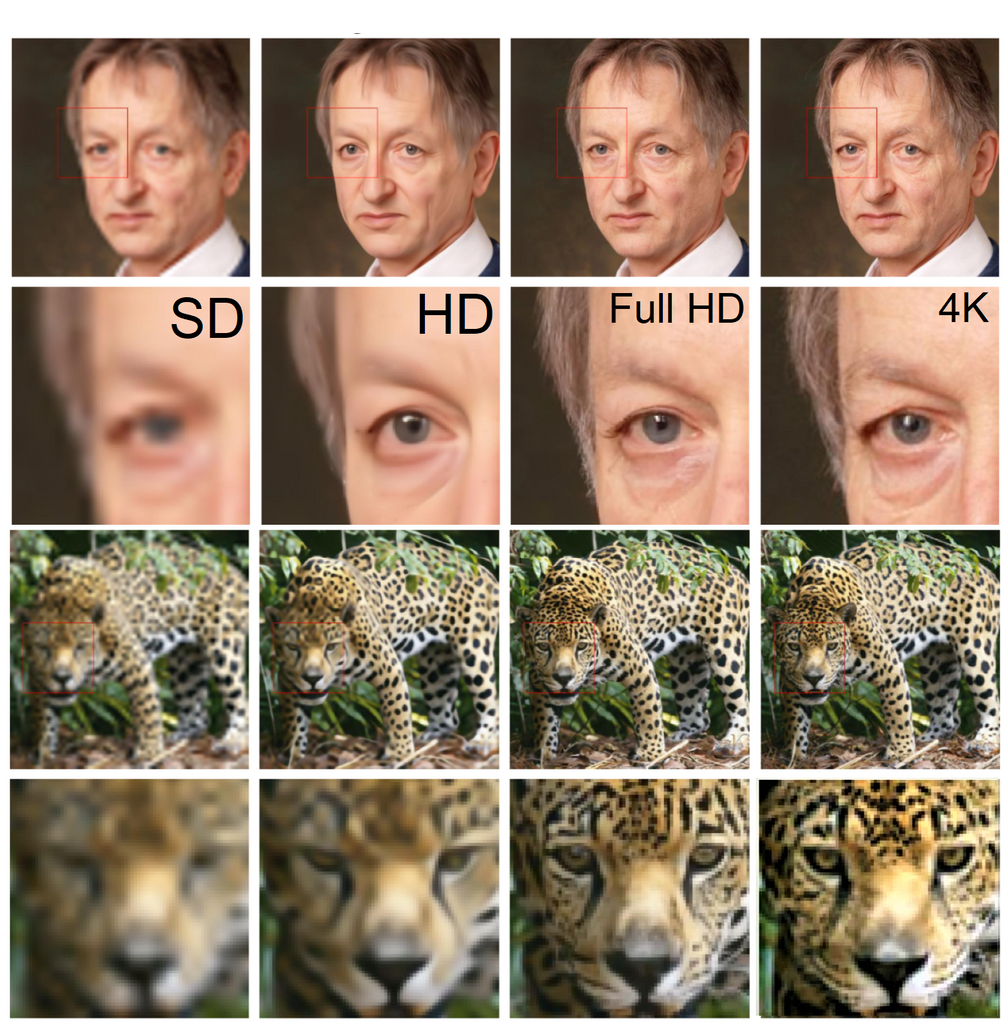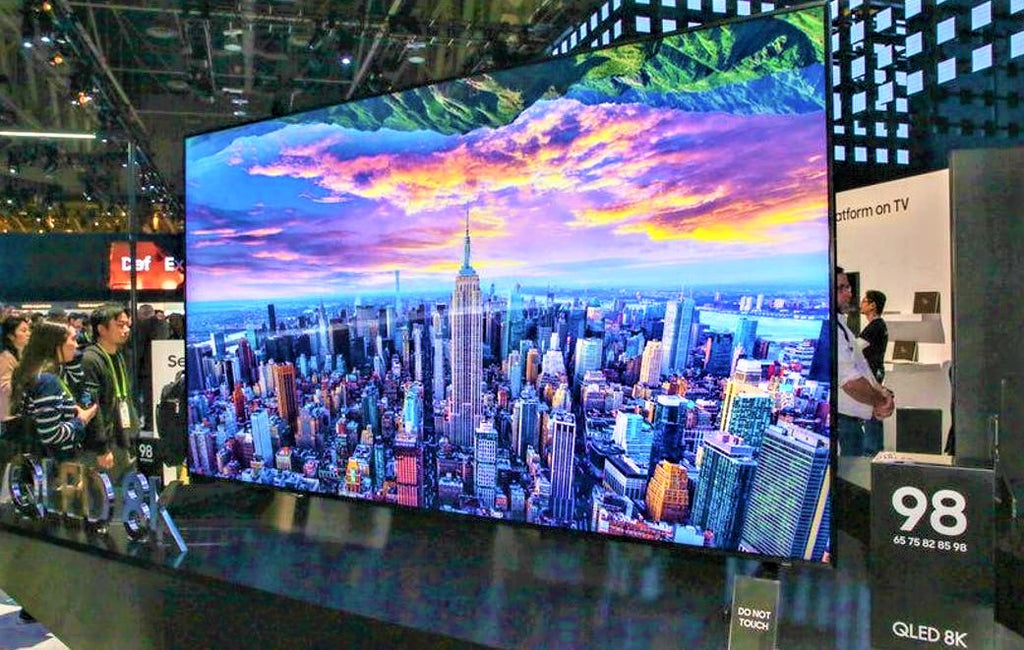
Which TV to choose ?
In addition to the format, other characteristics should be taken into account such as image resolution, refresh rate, dynamic range etc.
With the start of the Olympics, which will be followed by the US Super Bowl, there will be plenty of viewing time available, especially with the first broadcast of the games in 8K resolution. China Media Group (CMG), China's dominant state-owned media, has just announced the launch of CCTV-8K, an 8K TV channel8K format TV channelsee s upcoming 2022 Olympics in Beijing, so no doubt there will be clips available here on streaming platforms like YouTube and so on.s Olympic Games, so no doubt there will be clips offered here by streaming platforms like YouTube and Co. then...
Follow the guide.
What determines the required stand-off distance?

There are many myths about this, but you should know that brightness does not give you a headache and that your eyesight does not deteriorate from staring at a screen too closely. The real reason for distance is a matter of comfort and immersion in the viewing experience. In the past, we had to be further away from our screens because the image was inaccurate and our eyes and brains would get tired trying to focus our eyes. To understand what is happening, look at your hand for a minute and suddenly look away: there will be a delay before you clearly grasp the distant visual. Your eyes will have adjusted. If your screen is blurry, your eyes will be constantly trying to adapt, causing fatigue. Since the introduction of high-definition (HD) television sets in 2005, this problem no longer exists.
With the difficulty of focusing gone, what remains is the desirable immersion in the image. In other words, if you are too close you will not see the whole picture and if you are too far away or the screen is too small, you will no longer have the impression that you are part of the action.
Viewing distance versus diagonal format
When measuring a television screen, the measurement should be taken diagonally, not width or height. The size of a television refers to its diagonal length, which is derived from measuring from the top left corner of the television screen to the bottom right corner. Most screen sizes are expressed in inches.
Depending on the resolution of your screen, the distance required will vary. In this respect, there has been real progress. For reference, a 55-inch screen used to require a viewing distance of 13.75 feet, whereas a 4K resolution screen will now require a viewing distance of only 5.5 feet!
There are different resolution levels, but only 4K and 8K are currently available with very little full HD and only in small formats.  Demonstration of the amount of visual information depending on the resolution.
Demonstration of the amount of visual information depending on the resolution.
Terminology
The SD for "Standard Definition" has between 480 by 525 lines of pixels on broadcast to 750 by 576 on DVD. This format is discontinuous, think tube TVs...
The HD and Full HD: the former comes in 720 by 1280 dots or pixels while the latter offers 1080 by 1920 pixels. Most of the material offered by traditional cable services falls into this category.
The 4K offers almost 4000 horizontal lines or 2160 by 3840 pixels/line. This is the most common format. It can be found on some cable channels and on all digital platforms such as Netflix, Disney, Amazon, YouTube, etc.
The 8K now available for 3 years offers the best in realism and will be featured during the Beijing 2022 games. 4320 by 7680 pixels will form a screen with more than 33 billion dots!
General rule for calculating the distance to your screen
Old Ratio: SD

We aim for 3.5 to 4 times the diagonal.
32 inches recommended distance of 9 feet.
55 inches recommended distance of about 14 feet.
Intermediate ratio Full HD

For the better-defined HD, 1.5 to 2 times the diagonal is the best choice.
32 inches recommended distance of 5 feet.
55 inches recommended distance of about 7 feet.
 Samsung NeoQLED 98 inch TV
Samsung NeoQLED 98 inch TV
These super TVs offer a performance that approaches natural vision, the ratio required is greatly reduced. That's why we add to the minimum viewing distances, an approximate distance at which you start to distinguish individual pixels or points so that you can enjoy a more immersive experience without viewing distance restrictions and look closer without noticing individual pixels. As you will see in the following table, you can get really close to a 4K or 8K TV before you have a real degradation of the experience.
Recommended distance for modern TV
85 inches
Ideal distance: 8.5 feet for maximum immersion.
Maximum distance for satisfactory immersion: 13.4 feet.
Close range without seeing the pixels: 4.9 feet for 4K and 2.5 feet for 8K.
75 inches
Ideal distance: 7.5 feet for maximum immersion.
Maximum distance for satisfactory immersion: 11.8 feet.
Close range without seeing the pixels: 4.4 feet for 4K and 2.2 feet for 8K.
65 inches
Ideal distance: 6.5 feet for maximum immersion.
Maximum distance for satisfactory immersion: 10.2 feet.
Close range without seeing the pixels: 3.8 feet for 4K and 1.9 feet for 8K.
55 inches
Ideal distance: 5.5 feet for maximum immersion.
Maximum distance for satisfactory immersion: 8.7 feet.
Close range without seeing the pixels: 3.2 feet for 4K and 1.6 feet for 8K.
43 inch 4K only
Ideal distance: 4.3 feet for maximum immersion.
Maximum distance for satisfactory immersion: 6.8 feet.
Close range without seeing the pixels: 2.5 feet.
NOTE THAT BEING A LITTLE FURTHER OR CLOSER IS NOT DRAMATIC!
You will be satisfied as long as the television is of good quality.
Things to know besides distance
You've measured your room and determined where you're going to sit and watch, that's good, but that's not all.
There will be at least two other criteria to look for: HDR and refresh rate.
HDR
The resolution only tells you one thing, the number of dots used to sharpen the edges of the images produced. Let's say those dots are about as bright as each other, you won't see much, believe me! This is where the recent technology called HDR, HDR10+, comes in. HDR stands for High Dynamic Range 10 bit and relates to the contrast and intensity in the colours. A TV with this technology will give you a much sharper and more vivid picture, which will allow you to watch even more closely because there will be more to watch.
RAFRA RATEÎCHISSEMENT
The second criterion will be to require 120 Hz versus 60. A 60 hertz TV will refresh the picture sixty times a second while the other will clock in at 120. The more often the picture refreshes, the less blur there will be in action reproductions in games, sports and other high-speed activities.
Final consideration: the style of implementation
Depending on your room, you can decide whether to place the TV on a piece of furniture, on the wall or even on the floor directly. One manufacturer even offers a TV that disguises itself as a painting-like frame when not in use!



The sound bar, essential complement or not?
Depending on the model you choose and the type of viewing, you may choose to enhance the sound quality to promote an unsurpassed ambience, or even better audibility. First, if you are looking for realistic listening, you should either buy a sound bar or opt for a better TV. We invite you to ask for a sound demonstration of the TV you want. You'll be surprised to hear a rich, well-balanced sound from a higher-end model compared to a lower-end model. It's night and day. The more expensive TV, in addition to offering a more realistic picture, will have a pleasant sound, whereas the Econo models will sound "grumpy".
However, if you mainly watch action films, you should opt for a sound bar to really be enveloped by the soundtrack. Even better, ask to see and hear a high-fidelity set (cinema sound system) to experience the atmosphere of the cinema at home. This will be the subject of a future column!
The final word
Any excuse will do, so why not take advantage of occasions such as the Olympics and major annual sporting events to treat yourself? With today's cinematic advances, a brand new TV is a guarantee of endless entertainment. Whether you're a fan of games, movies or sports on the screen, your home comfort bubble will only be enhanced. Gone are the dayswhen grandpa kept his TV TV until he died to replace it. Today's televisions are constantly and significantly developing as a technological product. Just like most things today, changing models brings its own share of wonder! Explore the idea of 8K as well, so you'll be ahead of the curve and have a current technology TV for years to come. Incidentally, YouTube is now broadcasting 8K and mainly nature documentaries. Having a big TV means seeing for real!
We wish each other proud medals from our athletes and as always, we invite you to... stay tuned!
 The Wall 583 inches by Samsung!
The Wall 583 inches by Samsung!

